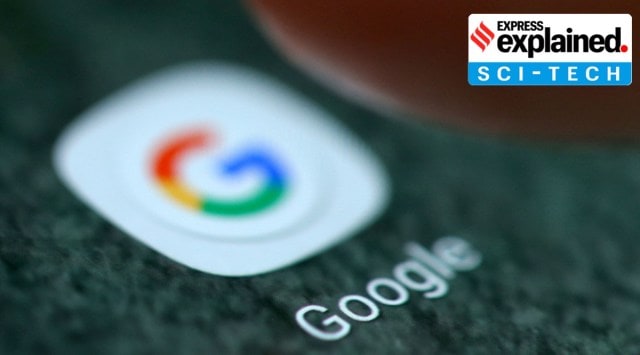- India
- International
Explained: Why is Google getting sued for location-tracking?
Google is being sued by several states in the United States for its "deceptive tactics" around disclosing location data and how it is collected. What has Google been accused of? How has the company responded?
 The Google app logo is seen on a smartphone in this picture illustration. (Reuters: Dado Ruvic)
The Google app logo is seen on a smartphone in this picture illustration. (Reuters: Dado Ruvic)Google is being sued by the states of Texas, Indiana and Washington DC over the company’s ‘deceptive tactics’ around disclosing location data and how it is collected. The lawsuit is based on a 2018 report by news agency The Associated Press (AP).
The report had highlighted how Google continued to collect user data, even if the user turned off the option from the settings of their device. After the report, Google was forced to update its policy on location tracking.
What is the lawsuit? Has Google been sued before?
According to Bloomberg, a group of state attorneys general, including Texas, Indiana and Washington District of Columbia (DC), announced Monday they were suing Google over the deceptive practices related to location data collection. Google’s policy is likely in violation of some state laws designed to protect consumers.
The crux is that Google continues to collect user location with the “Web & App Activity” feature, even if the user specifically turns off location tracking on their phone. The lawsuit is based on the 2018 AP report. Portions of the lawsuits were redacted, and the copy of the Washington DC complaint said it was filed under seal, adds Bloomberg.
The report adds that the lawsuit by the District of Columbia also cited internal Google discussions in which employees said its location history disclosures were “definitely confusing,” and that account settings appeared designed to create the illusion of user control.

The lawsuits also target Google’s user privacy settings, calling them confusing and conflicting. This is not the first time Google is being sued for such claims. A similar case was filed against the search and advertising giant by the state of Arizona in 2020 around location tracking, arguing that the search giant made it impossible for users to not share location.
A Google spokesperson said the lawsuits are “based on inaccurate claims and outdated assertions about our settings”. Vowing to defend itself and set the record straight, Google said it has “always built privacy features into our products and provided robust controls for location data”.
What is the issue about Google collecting location data?
According to the DC lawsuit, location data is the most sensitive, and even a limited amount collected over a time will expose a person’s identity and routines. The lawsuit states, “Location can also be used to infer personal details such as political or religious affiliation, sexual orientation, income, health status, or participation in support groups, as well as major life events, such as marriage, divorce, and the birth of children.”
It further argues that such data in the hands of Google is powerful because the company can then monitor consumers’ daily lives, especially since so many depend on the company and its products on a daily basis. This data can be used to derive insights about consumers and then also sell advertising ‘targeted’ to them, it adds.
It also states Google has financial motives at stake given the billions of dollars in advertising and that is another reason why it wants to make it more difficult for users to opt out of location tracking. The lawsuit adds that it has been filed “to correct the deceptive and unfair practices that Google has used and uses to obtain consumers’ location data, and to ensure that consumers are able to understand and control the extent to which their location data is accessed, stored, used, and monetised by the Company.”
How does Google actually collect location data?
It is true that Google does provide the option to turn off collection of location data around a device. But some location data is still collected.
 On most Android or iOS phones, if you sign into your Google account, be it for Gmail or Google Maps, location data is collected from the device. Remember, Google Maps will not work if you do not allow it access to the location settings. A user’s Google account also has some privacy settings, which can be accessed by going to the ‘Manage your account’ page.
On most Android or iOS phones, if you sign into your Google account, be it for Gmail or Google Maps, location data is collected from the device. Remember, Google Maps will not work if you do not allow it access to the location settings. A user’s Google account also has some privacy settings, which can be accessed by going to the ‘Manage your account’ page.
In the ‘Data & Privacy’ segment, there is an option for History Settings. The options listed here are Web & App Activity, Location History and YouTube History. Users have the option of turning off each of these, and Google will technically not be able to collect that data and store it for your account.
For instance, if you turn off YouTube History, it will not keep a tab of YouTube videos you watch and the things you search for on YouTube to give you better recommendations, etc. The same logic technically applies to Location History.
If you turn it off, Google says the “device’s locations will not be automatically saved to your Location History.” It also adds that any “previous activity is not deleted from your Location History.” A user has to manually delete this from the settings. Also keep in mind that settings settings for other location services on your device, like Google Location Services, Location Sharing, and Find My Device, are not changed.
But really the most important bit of information about these settings is posted at the end. It notes, “Some location data may continue to be saved in other settings, like Web & App Activity, as part of your use of other services, like Search and Maps, even after you turn off Location History.”
So even if you turn off location history, Google will still collect some of this data. And this the lawsuits argue is confusing users, and a deceptive tactic.
It should be noted that after AP had revealed this problem back in 2018, Google had changed the help page for Location settings. The older version of the help would only mention that users can turn off Location History at any time.
It used to say, “With Location History off, the places you go are no longer stored. When you turn off Location History for your Google Account, it’s off for all devices associated with that Google Account. You can also turn off Location History for a device.” It did not mention that Google would collect this data via other services. That was later updated with the part which we’ve mentioned above.
How to turn off the Location History feature on your Google account from your phone
For those wondering how to turn off Google’s ‘Location History’ setting from the app on your Android or iOS device, here are the steps. The settings are available in the Google app for iOS as well, though you will need it installed on the device.
1. Go to the Settings app on your Android device and tap on “Google.” On iOS, go to the Google app and tap on your profile picture
2. Select the ‘Manage your Google Account’ option, which shows up on both Android and iOS.
3. Tap on ‘Data and Privacy’. In the Activity controls section, tap “Location History.”
5. Switch off Location History by swiping the button to the left.
Newsletter | Click to get the day’s best explainers in your inbox
More Explained
EXPRESS OPINION
Apr 19: Latest News
- 01
- 02
- 03
- 04
- 05








































